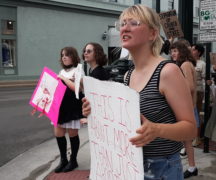When it meets on Monday, the Ohio Controlling Board won’t consider most of the funding requests by advocates who say hundreds of thousands of low-income Ohioans might face hunger and eviction in the coming weeks.
The advocates say that with the expiration of federal unemployment supplements and eviction moratoriums — and with the resumption of utility cutoffs — Ohioans who had been hanging on financially will no longer be able to do so.
Last week, they requested $243 million from Ohio’s remaining $1.3 billion in federal coronavirus-relief funding for housing, daycare, food and utility assistance. On Thursday, Gov. Mike DeWine said he shared those concerns, but he had to prioritize the fight against coronavirus over them.
When the controlling board meets Monday, it will consider only two expenditures from the remaining federal CARES Act funding.
One would put $31 million toward child care.
But advocates for Ohio’s poor say the funds are restricted to daycare facilities that maintain low child-to-teacher ratios as part of an effort to reduce the spread of the virus. They say many low-income parents often can’t afford to send their kids to such facilities.
The other item the controlling board will consider is almost $100 million in additional CARES Act money for coronavirus testing. DeWine on Thursday said that continuing to ramp up testing is essential to controlling the spread of the disease.
Absent from the controlling board agenda is the $100 million Advocates for Ohio’s future requested for emergency rental assistance.
Bill Faith, Executive Director of the Coalition on Homelessness and Housing in Ohio, last week said that he expected the number of evictions to jump once the 30-day notification period ends at the start of September. He said that won’t lead to instant homeslessness for many, but it would begin a slide into instability.
“People who get evicted don’t necessarily end up homeless,” he said. “They might go to family, they might rely on other ways to get housing… When people face eviction, it’s entirely disruptive to their entire family. It’s hard to get to work if they don’t have stable housing. It’s hard for their kids to continue to stay in school even if it’s virtual. Everything is disconnected.”
In a related matter, more evidence emerged Friday of how differently the coronavirus-related economic crash is affecting the poor and the well-off.
The Washington Post reported that while the overall number of mortgage delinquencies was down in July, the number of serious delinquencies — those of at least 90 days — hit its highest point in 10 years. The story noted that serious delinquencies track closely with unemployment and are particularly high in states whose economies depend most heavily on the service industry.
***
Also from Ohio Capital Journal:
Legal assistance foundation: Pro bono work sees increase
A nonprofit legal assistance group said Ohio’s attorneys have contributed to a significant increase in free legal services in the last year.
The Ohio Access to Justice Foundation reported a 70% increase in pro bono donations since 2018, and more than $26 million worth of pro bono work done since last year.
The pro bono work amounted to about 105,000 hours conducted by more than 3,700 attorneys, according to the foundation. The rise comes even as the reporting period for the year was cut short due to COVID-19, the foundation stated in its report.
“During these challenging times, it is more critical than ever that attorneys volunteer to help those facing unemployment issues, evictions, foreclosures, and other pandemic enhanced legal problems,” said Ohio Supreme Court Chief Justice Maureen O’Connor in a release. READ MORE
Mailbag: Is Ohio still a swing state? And why do we have so many counties compared to bigger states?
Confession: I am sort of bummed there will be no national conventions this year.
At least, not in the traditional, pomp-and-circumstance, Clint Eastwood-talking-to-an-empty-chair way.
Sure, they are gaudy. Of course, they are needlessly dramatic. But these conventions only happen once every four years. I like seeing the up-and-coming politician try to make a name for themselves. I enjoy the D-list celebrities invited to do early evening crowd work.
Alas, there is this pesky pandemic still going on, and hosting thousands of politicos in one arena is not the smartest idea. (Perhaps it’s not a good idea in normal times.) …
Now on to the mailbag … READ MORE





